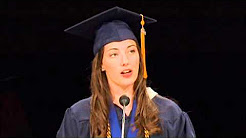The interconnected nature of the spiritual and secular learning that takes place at Brigham Young University is one of the defining characteristics of a BYU education.
Good afternoon. I feel honored and humbled to share a few words with you. How privileged we are to have attended this fine university. As we move forward, we cannot forget the great debt of thanks we owe those who have helped us get here—parents, friends, and loved ones, as well as the faculty, staff, and administrators of Brigham Young University. A special thanks to President and Sister Samuelson for their dedication and love in leading this university and to Elder Craig C. Christensen for speaking to us today.
I knew that BYU was a unique university when I sat down for my first day of calculus my freshman year and my instructor asked the class for a volunteer to offer an opening prayer. Never before had I witnessed an educator invite the Spirit into the classroom to magnify both her ability to teach and our capacity to learn.
The interconnected nature of the spiritual and secular learning that takes place at Brigham Young University is one of the defining characteristics of a BYU education. While many of us have grown spiritually through our religion courses, countless “nonreligious” experiences both on and off BYU campus have also encouraged our spiritual development.
I first began to appreciate how the Lord’s hand guides all types of academic pursuits through a story that one of my professors shared. He related how his life’s work for the past twenty years had centered on finding a new proof for a well-established theorem. This quest had begun in graduate school, when he had stumbled across a new technique that he believed could prove the theorem in a simpler, more efficient way. He came very close to finishing the proof but could never complete a certain step, despite years of work. The professor became somewhat emotional as he described how, after all his efforts, he finally admitted defeat and prepared to move on. Then the next morning, when he woke up, he could clearly see the solution in his mind. It was so simple and so beautiful that he thought it impossible no one else had seen it before. Needless to say, he was able to rigorously demonstrate that the proof technique was correct and that its correctness made it highly valuable.
These “sudden strokes of ideas,”1 as Joseph Smith called them, can and do come to people in all disciplines. However, moments of inspiration in academic research are not the only ways in which we have seen the spiritual and the secular converge. We have each observed this pattern in different situations. Allow me to share just a few of my own such experiences.
In a bookbinding class I discovered my ability to create something of beauty and worth, and the affinity that Heavenly Father feels toward us as His most precious creations. By writing a paper about President Hinckley speaking at a devotional, my testimony of prophets was strengthened. After watching dance performances and athletic events, I began to comprehend the magnificence of the human body. And through the Study Abroad program in Jerusalem, my eyes were opened to the reality of the Savior’s life and Atonement. While your experiences may differ from mine, I’m sure that every graduate in this ceremony can appreciate the importance of enduring to the end. Our ability to grasp eternal truths through our worldly pursuits should not be surprising, for, as the prophet Alma taught, “all things denote there is a God.”2
The incredible gift of a BYU education is that it not only enlarges our intellectual capacity and strengthens our spiritual sensitivity, but that it accomplishes these two goals simultaneously. If you want to recognize ways in which the Spirit has influenced your educational path, I invite you to try to remember. President Henry B. Eyring would write in his journal each day to remember how he had seen the Lord’s hand in his life. Of this experience he said:
As I would cast my mind over the day, I would see evidence of what God had done for one of us that I had not recognized in the busy moments of the day. As that happened, . . . I realized that trying to remember had allowed God to show me what He had done.3
I encourage each of you to take a few moments and try to remember how God’s hand has touched your life during your time at BYU.
C. S. Lewis stated: “I believe in Christianity as I believe that the Sun has risen, not only because I see it, but because by it I see everything else.”4 May we ever aim to see our life experiences through the Light of Christ. As we do so, we will gain a greater capacity to help others recognize the interconnected nature of spiritual and secular education and thereby pass on the legacy of learning we have attained here at Brigham Young University. Thank you.
Notes
1. HC 3:381.
2. Alma 30:44.
3. Henry B. Eyring, “O Remember, Remember,” Ensign, November 2007, 67.
4. C. S. Lewis, “Is Theology Poetry?” The Weight of Glory and Other Addresses (San Francisco: HarperSanFrancisco, 2001), 140.
© Brigham Young University. All rights reserved.

Chelsea Johnson Kennedy spoke as the representative of her graduating class at BYU commencement on 11 August 2011.

